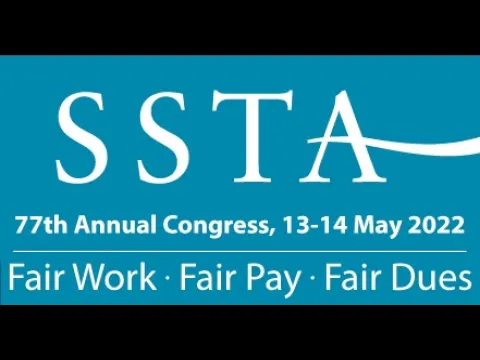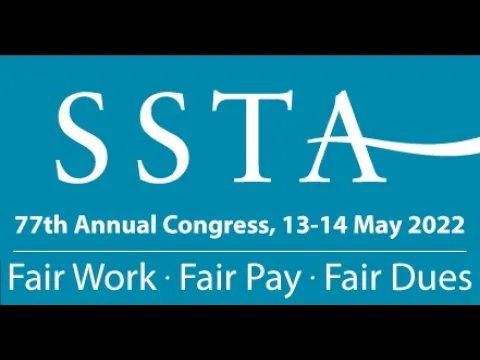The following motions were passed at the 77th Annual Congress of the SSTA on Friday 13 May and Saturday 14 May 2022.
Motion A
Congress calls on the Scottish Government to direct Local Authorities to recognise the critical nature of excessive class contact time in obstructing progress in CFE by allocating 90 minutes per week to teachers within the WTA as an interim measure before full implementation of the 21 hours maximum teaching time.
Motion B
Congress notes the failure of COSLA to recognise the importance of school teachers in the education system and its failure to enter into respectful negotiations with the SNCT Teachers’ Side throughout the pandemic and notably during the current teacher pay negotiations.
Congress calls on the Scottish Government to remove COSLA from the SNCT (the tripartite negotiating body for teachers’ pay and conditions) and enter into direct negotiations with the Teaching Unions.
Motion C
Congress is alarmed by the inconsistent approach by Local Authorities to the place of Home Economics in the curriculum and the failure to ensure that all pupils at all ages in secondary schools have their entitlement to Home Economics fulfilled.
Congress notes the findings of the recent SSTA survey on Home Economics which highlights the excessive workload expected of Home Economic teachers which is often ignored by Local Authorities. There is a concern that this suggests discrimination of these specialist and predominantly female teachers.
Congress calls upon the Scottish Government for
- a major review of Home Economics and its place in the curriculum
- a major recruitment programme for Home Economic teachers
- trained technician support for HE
- a commitment at SNCT to ensure that Home Economics teacher workload is recognised and measures adopted to ensure that the exploitation of HE teachers ceases.
Motion D
Congress welcomes the Scottish Government’s manifesto commitment to reduce the maximum amount of pupil contact time from 22.5 hours to 21 hours per week, believing that for Scotland’s pupils to receive the quality of education they deserve, Scotland’s teachers require sufficient time to enable this to be delivered.
However, Congress is concerned that the Scottish Government and COSLA have not shown the willingness to increase salary levels sufficiently to address the current shortages of secondary teachers being experienced by schools across the country, let alone to increase the numbers of secondary teachers to the levels that will be required for the manifesto commitment to be achieved.
Congress therefore calls on the Scottish government to make delivering on this manifesto commitment a top priority and to support this by financing the kind of pay increase for teachers that will be needed to attract sufficient extra secondary teachers into the profession.
Congress also calls for the SNCT handbook to be updated to change the formula for ‘personal time’ from a 1/3rd of maximum pupil contact time, at present, to 3/7th when maximum contact time is reduced to 21 hours, so as to ensure that all the extra time removed from teaching duties is added to the proportion of time under the direct control of individual teachers.
Motion E
Congress calls upon the Scottish Education Secretary and the SNCT to instigate an immediate review of the priorities in the School Working Time Agreement (WTA).
The WTA mechanism, which is supposed to control the amount of time teachers must commit to collegiate tasks to 5 hours per week within the notional 35 hour working week, has proved itself unable to protect teachers from excessive, unplanned, additional work pressures in the face of continual changes to course content and assessment arrangements being made by Scotland’s exam body.
A new agreement must put the role of teaching and learning related tasks in the classroom as the overriding priority, reduce time spent on other tasks and ring-fence significant time to be available, should changes to course content or assessment arrangements generate work that needs to be completed during the life of a current Working Time Agreement.
Motion F
Congress calls on the Scottish Government to ensure that teachers’ professional associations are given the opportunity to engage fully in consultations and planning relating to any changes arising from Professor Muir’s report “Putting Learners at the Centre: Towards a Future Vision for Scottish Education”.
Motion G
Class sizes should reflect the workload involved in meeting learners’ needs. To achieve excellence and equity for all learners, and to reduce teacher workload, archaic maximum class size arrangements which do not meet modern curricular aspirations must be reviewed.
Congress calls on the Scottish Government to work with the SNCT to dynamically reduce maximum class sizes, thereby addressing the spectrum of learners’ needs.
Motion H
Congress notes that education has changed considerably since the division of subjects into practical and non- practical subjects for maximum class size purposes. It also notes that the proportion of pupils with significant additional support needs, and often requiring more individual teacher time and input, is much higher than when the current maximum class sizes were set.
Congress believes that, in light of the current education landscape, the time for maximum class sizes to be reviewed is well overdue and calls on the Government to instigate such a review without delay.
Motion I
More than ever teachers report feeling stressed and vulnerable as a result of behaviour issues amongst pupils which are currently beyond schools’ ability to address. Poor behaviour impacts negatively on learning and teaching and the wellbeing of the whole learning community. Teachers and pupils are entitled to a safe working and learning environment.
Congress calls on the Scottish Government to carry out an urgent review of behaviour support and management in schools to identify and fund additional resources which aim to ensure that teachers and pupils are fully supported.
Motion J
With regard to the Scottish Government’s revised GIRFEC documentation, Congress calls for the role of Named Person to be allocated only to staff of sufficient seniority, with a full training programme for the role and appropriate responsibility payment.
Congress further calls for sufficient protected time to be allocated to this important role within a school, particularly in view of the extensive communication with external agencies called for in the documentation.
Motion K
In line with the Equalities Duties on Public Bodies, Congress calls on Scottish Local Authorities to continue to record and monitor the sex of employees as part of addressing Equalities of the protected characteristic Sex. This should be supplemented by also seeking information on the Gender Identity of employees to help monitor and address Equalities of transgender members of staff.
Motion L
Congress supports the Government’s intention to reduce class contact time for teachers. Congress notes that, for this to be achievable across all subject areas, meaningful targets for Initial Teacher Education (ITE) and student teacher recruitment in specialist subjects such as Technical are required.
Congress is also concerned that Post Graduate Diploma in Education ITE training in technical subjects lacks sufficient instruction on practical woodworking and metalworking skills, relying on teachers in placement schools to provide this. Congress calls for this to become a greater emphasis as part of the ITE training course for these students.
Motion M
Congress congratulates the Scottish Government and COSLA in their ambition to support the mental health of young people as part of their COVID recovery plan
Congress calls on these bodies to extend this ambition to improve mental health in schools to include staff. This would require free meaningful support and active strategies to improve staff wellbeing.
Motion N
Congress recognises that the past two sessions have been challenging for all PGDE students and Newly Qualified Teachers (NQT). These challenges have resulted in a lack of ITE instruction and placement practice for practical subject students. Congress calls for a programme of further practical instruction throughout the NQT year for all practical subject teachers.
Emergency Motion 1
The SSTA supports the Scottish Government in their response in both welcoming and supporting all refugees.
Most recent figures from UNHCR suggest that there are currently 5.4 million refugees from the war in Ukraine. Most of these displaced people are women and children. However, research from School Education Gateway Europe states that:
“Challenges facing child refugees to integrate is an issue that teachers are expected to solve.” (Cosmin Nada SEG.EU)
The European Union has made funding available across Europe to support teachers in their crucial role in supporting child refugees integrate whilst dealing with the trauma of war. In Scotland, much of the support offered to refugees will and does fall on the shoulders of extremely hard pressed ASN colleagues. Budgets have been squeezed and ASN staff numbers are under serious pressure.
The SSTA calls upon the Scottish Government to ensure that funding is made available to all local authorities that is ring fenced for the sole purpose of providing the support required for all child refugees to preserve their own individual identity in an already diverse classroom and culture.
Emergency Motion 2
The Scottish Government has announced that it intends to replace SQA by 2024, along with the reform of exams and national qualifications. The Cabinet Secretary for Education has stated that new qualifications will be developed to ensure learners’ achievements are fairly recognised. It is expected that externally marked exams will remain part of the new assessment approach. This will be a major reform for Secondary schools in Scotland. The SSTA calls on the Scottish Government to publish a clear timeline of how the substantial changes to assessment will be achieved.”



